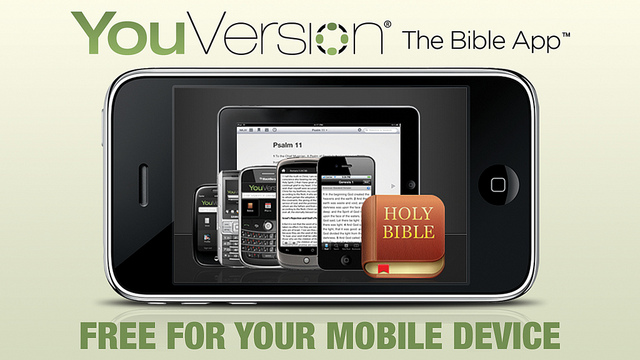By Jeff Brumley
The Bible at your fingertips. A worship service in the palm of your hand and prayers and devotions streaming into your ears.
The advent of the app has made all of that possible for any Christian with a smartphone. But could the convenience of technology sap the spiritual vitality from faith?
Not for those who still seek fellowship, some pastors say.
“Nothing will replace the Eucharist, nothing will replace a 10-person Bible study and nothing will replace an eight-person prayer group,” said Alan Rudnick, a pastor, speaker and author who often writes about the intersection of popular culture, technology and religion.
But others aren’t so sure about that and fear that the easier it gets to access faith on a smartphone, the harder it will be to maintain an authentic, challenging Christian witness.
One of those is Kaitlyn Schiess, who penned “Are Smartphones Making Christianity Too Convenient?” for Christianity Today’s Her.meneutics blog.
Schiess said she’s a user of some of the very apps that could be contributing to a growing laziness among believers around everything from reading scripture to praying.
“But with each new app to download, I began to wonder about the downside of the convenience demanded in almost every area of our lives,” she wrote. “Innovation has come through again and again on its promise to make our lives more efficient. But with our high-tech expectations, has convenience become an idol?”

As faith-based apps grow in popularity, they make a daily devotion as easy as ordering a pizza or streaming a video.
“You don’t have to leave your bed, open a Bible or spend more than five minutes to check your daily devotions off your to-do list,” Schiess wrote.
Pretty soon, she adds, convenience trumps ministry and missions in an effort “to make Christianity as painless as possible.”
Scarier still is the possibility that faith will become just another icon on a crowded smartphone screen.
“Using apps aimed at streamlining our lives could cause us to view our time with God as yet another intrusion,” Schiess said.
‘The gifts of convenience’
But some ministers, after reading the blog, weren’t quite ready to declare the tech-versus-faith situation a lost cause just yet.
Rudnick said it comes down to how individuals, and churches, actually use the technology.
Bible and devotional apps can be tools for spiritual growth or can stunt development if they becomes ends in themselves, said Rudnick, executive minister at Dewitt Community Church in Dewitt, N.Y., and a contributing writer for BNG.
Churches should encourage both approaches to faith, he said.

“There are always people who are connected through tech and those who are not,” he said. “If you abandon one or the other you are throwing away the gifts of convenience God has given us.”
That convenience can be a blessing was evident in the invention of the printing press, which made Scripture available to the masses for the first time.
But congregations should also avoid embracing or pushing apps or other online technologies as a tactic for attracting new members, Rudnick said.
“Those tools should be used to reach people who have never been reached before, but not just to keep up with Willow Creek or Saddleback.”
Theology the greater threat
Theology is more likely than technology to take the challenge out of Christ’s teachings, said Cody Sanders, pastor at Old Cambridge Baptist Church in Cambridge, Mass.
That happens through “a theology too exclusively concerned with what we believe, with believing the right things about God or Jesus,” Sanders said.
Such a theology is “overly concerned with orthodoxy rather than a practice of faith that is rooted in peace and justice and following Jesus who challenged the dehumanizing practices of his time.”

Sanders said few people in his congregation seem to be engrossed in app-based spiritual practices, including the 20- and 30-something undergraduate and graduate students. In fact most, during worship, will reach into the pew rack for a Bible and read along during Sunday worship.
But Sanders said it’s especially meaningful this week — with Reformation Day falling on Saturday — that app-based Bibles are enjoying some measure of popularity.
“It’s pretty encouraging to know that people are accessing the Bible in whatever way they are accessing it,” he said.
‘A solely private matter’
But another minister said he sees a great deal of validity to the concerns Schiess articulated on the Christianity Today blog.
Chris Canary said he assumes the app developers have honest intentions of helping people deepen their faith through a process of spiritual formation.
But what if, as Schiess said, these practices are harmful?
“It seems to me the majority of daily devotions and pop-up studies, while convenient, are pretty weak,” Canary, university minister at First Baptist Church in Norman, Okla., told BNG. “I’m generalizing here, but skimming a couple verses and then rushing through a short devotional doesn’t seem healthy to me. We can do better.”

A drawback to the Bible and other religious based apps is they can detract from the fellowship and from experiencing scripture through community, he said.
“Whether intentionally or inadvertently, a possible consequence of using these tools may lead people to think of their faith as a solely private matter.”
Rudnick agreed technology can lead to isolation. But so can other things.
“There are always going to be people who misconstrue convenience with individuality,” he said.
